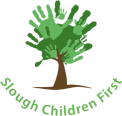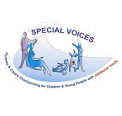Lynch Hill Primary Academy

At Lynch Hill Primary Academy we aim to develop children:
- as motivated individuals who strive for high academic achievement
- as responsible and caring members of the community
- as independent, life-long learners
- who have high self-esteem, respecting themselves, others and the world around them.
We demonstrate our commitment to working as a learning community by:
- striving for continuous improvement in all that we do
- working collaboratively towards common goals
- achieving ‘Investors in People' Gold Award, the Basic Skills Award, Healthy Schools status and Artsmark
- working towards The Challenge Award and International Schools' Award.
Who to contact
- Contact name
- Charley Seaman
- Contact position
- SENDCO
- Telephone
- 01753 524170 01753 524170
- office@lhspa.org.uk
- Website
- Lynch Hill Primary Academy
- Scan to visit this website
Where to go
- Name
- Lynch Hill School Primary Academy
- Address
-
Garrard Road
Slough
Berkshire - Postcode
-
SL2 2HX
Find SL2 2HX on a map
Time/date details
- When is it on
- Monday- Friday 8am-5pm during term time
Local Offer
- Description
Lynch Hill Primary Academy is a thriving four form entry primary school which caters for children from nursery to year 6. At Lynch Hill, we believe that every child should be equally valued, irrespective of abilities or individual differences and encouraged to develop to their full potential. We are committed to providing all children with an inclusive learning environment so that they can aim high, removing barriers to learning to enable them to work hard and ensure that their wellbeing is at the heart of all we do so that they know that we care deeply.
At Lynch Hill Primary Academy we continually strive to offer children the best we can. In order to achieve this we promote high achievement and learning for life through a number of key principles including; achievement and opportunities for all, guidance, safety and unity.
- Contact name
- Lindsey Tomlinson (Headteacher), Charley Seaman (SENDCo), Stacey Dean (Assistant SENDCo), Cathy Dyde (Early Years Inclusion Lead)
- Contact telephone
- 01753524170
- Contact email
- office@lhspa.org.uk
- Local Offer age bands
- Primary (4-10 years)
Schools extended Local Offer response
- Special Educational Needs policy
At Lynch Hill, we believe that every child should be equally valued, irrespective of abilities or individual differences and encouraged to develop to their full potential.
We recognise that it is the teacher’s responsibility to meet the needs of all children in their class through quality first teaching.
All pupils are expected to make progress and we offer a wide range of approaches to learning to support this. However, if a pupil is not progressing then teachers will follow the school’s graduated response. This is in order to allow us to provide focussed interventions as part of a graduated response, in line with the SEN Code of Practice.
Using an ‘Assess, Plan, Do, Review’ approach the provision offered to pupils is regularly reviewed to ensure it remains appropriate and external professionals are involved where additional support is required.
- Teaching and learning
High quality teaching and learning is a priority to ensure that children make good and sustained progress.
Quality teaching in the classroom is crucial. Children are given all the steps that they need to ensure learning is taking place in each lesson. They are given regular feedback from each other and their teachers to help them with their next steps.
A key to successful learners is to provide opportunities for children to develop their skills in overcoming challenges and building resilience.
We provide learning experiences for children that will build on their knowledge and give them time to apply their skills in a variety of ways. Children are often taught in a variety of groupings to offer a personalised and differentiated curriculum. Opportunities are given for personal feedback from the teacher and children are regularly given time to review and consolidate learning.
Our regular and ongoing assessments highlight quickly and efficiently when a more targeted and differentiated approach might be necessary.
We use:
- teachers and teaching assistants
- SEN teaching assistants,
- speech and language support assistants
- therapists
- other specialists.
Our Inclusion team meet regularly with staff and parents to discuss the teaching and learning plans we offer to our pupils. We ensure that the most effective and holistic approach is being applied to most effectively and efficiently meet our pupils’ needs.
- Identifying and assessing Special Educational Needs
We recognise that it is the teacher’s responsibility to meet the needs of all children in their class through quality first teaching.
All pupils are expected to make progress and we offer a wide range of approaches to learning to support this. However, if a pupil is not progressing then teachers will follow the school’s graduated response. This is in order to allow us to provide focussed interventions as part of a tiered response. Using an ‘Assess, Plan, Do, Review’ approach the provision offered to pupils is regularly reviewed to ensure it remains appropriate and external professionals are involved where additional support is required.
The Code of Practice (2015) states, a child of compulsory school age or a young person has a learning difficulty or disability if he or she:
- has a significantly greater difficulty in learning than the majority of others of the same age, or
- has a disability which prevents or hinders him or her from making use of facilities of a kind generally provided for others of the same age in mainstream schools.
The graduated approach has four stages of action:
- assess
- plan
- do
- review.
The assess stage is used to identify a child’s needs. The initial assessment is reviewed and where a professional assessment is required a referral will be made.
The ‘plan’ stage is where outcomes and steps are planned and these will consider the views of the child. Interventions are selected to best meet the identified outcomes.
During the ‘do’ stage, the SENDCo oversees the implementation of interventions or programmes.
The effectiveness of the intervention or support on the child’s learning is reviewed and evaluated. Changes to outcomes are agreed with parents and the next steps are planned.
- Involving parents and children/young people in planning and reviewing progress
Parents work closely with the school to support their child’s special needs.
We encourage parents to communicate regularly with their child’s class teacher to ensure a good relationship. The usual forms of communication are regularly used in the school such as face-to-face quick meetings at the beginning or end of day, phone, email and parent –teacher interviews. In addition to these forms of communication, we hold regular Individual Provision Map meetings, Team Around The Child and Annual reviews for children with an EHCP.
As part of our school values, we regularly hear what our pupils have to say and receive very positive feedback about their learning experiences. In addition as part of our annual SEN review, we request the views of the children with SEN, disability or who are Looked After by the Local Authority. We also ensure that we gather the views of our pupils for their Annual Reviews, usually through photographs or a personal interview. Children can represent their views as they wish to.
We are lucky enough to have committed staff at Lynch Hill School who are able to provide additional support in core subjects and to support children with Autism Spectrum Disorder and social and emotional needs. Wherever appropriate and possible, the school engages the services of :
- an Educational Psychologist
- health professionals
- speech and language therapist
- CAMHS
- social care.
- Additional support
The school offers many different forms of additional provision.
We endeavor to educate all pupils in class and are able to implement:
- in-class support
- one-to-one support
- flexible groupings (including small group work)
- access to specific resources such as mentoring, therapy and access to a wide range of outside agencies.
Additional provision is overseen by the school's Inclusion team and is designed and implemented by an excellent team of teachers, ably supported by a fantastic group of teaching assistants. Like with individual targets, the most important point is this: additional provision depends on the needs of the child.
In addition, all Lynch Hill pupils benefit from:
- a range of teaching and learning styles
- a differentiated curriculum
- a range of differentiated learning materials (both for reinforcement and extension)
- assessment procedures that emphasise pupils’ strengths and achievements; access to ICT
- differentiated booster classes in Year 6 and Year 2
- a broad range of extra-curricular activities.
- Extra activities
In addition to the curriculum the school has a variety of afterschool clubs which are open to all children in the school.
There is a broad range of activities that children can sign up to do including art and crafts, sport, games, cookery, drama and other exciting activities that our children enjoy.
The school arranges two residential trips a year to outdoor adventure sites which are hugely popular and open to all pupils in KS2.
Throughout the academic year, children are taken on at least two trips. One trip is educational and related to their learning and topic and one trip is to celebrate the end of the year and all of the successes the children have had.
- Meeting social and emotional needs of children/young people
The school offers children many provisions to support pupils with social and emotional needs.
We offer children social groups and additional lunch time support if they are struggling with play times. All our staff are trained to notice and reward positive behaviours. Class teachers are encouraged to use a collaborative reward to encourage children to work towards goals together.
If a child needs further support with their behaviour we have individual reward charts to motivate and boost self esteem. We have quieter learning areas in parts of the school to support children with Social and Emotional needs and wellbeing mentors to support children.
The school also offers low level bereavement support, play therapy, drama therapy and a counselling psychologist to support more significant social and emotional needs.
For children requiring more targeted and individualised emotional and social support the school has a fantastic Nurture group, Leo’s Pride and an ELSA.
We also have a pupil support lead who is able to provide bespoke plans for pupil's and work closely with them to help achieve their personal goals.
The school has a robust behaviour and anti bullying policy. Bullying is not tolerated and when an incident of bulling is identified the school acts quickly to resolve the issues.
- Keeping up to date with knowledge and skills
The professional development of staff is maintained through regular staff training in relation to teaching and learning. In addition to the extensive in house training staff are encouraged to seek training that will benefit and impact on the progress of our pupils.
We work closely with:
- the local authority and have regularly used specialist staff to train staff, TAs and dinner staff in working with children with social and emotional needs
- external agencies such who support the school through bespoke whole school training.
In school, we have staff who are trained nurture practitioners and are able to support children with a range of social, emotional and behavioural needs.
Staff throughout the school have undertaken a Level 2 qualification in understanding autism.
We run a Speech Links programme and in Early Years we use the WellComm Intervention to identify and support children with speech and language needs.
We currently have drama therapy, play therapy, Lego therapy, counselling and Emotional Literacy Support Assistant offering therapeutic emotional and social services.
As well as using the school’s experts, we often refer to specialists in the local authority such as the Educational Psychologist and Services for Learning Difficulties and disabilities. The school works closely with health visitors, school nurses and social care.
One of the Inclusion team’s key roles is to support the class teacher and additional staff in planning for children with SEN. The school has a training plan for all staff to improve the teaching and learning of children including those with SEN. This includes whole school training on SEN issues such as ASD, social and emotional development, learning differences, speech development and other relevant issues.
- Transitions
For children starting our Nursery, our staff conduct a home visit. This is an opportunity for both children and staff to begin to build a rapport and help the child feel more confident about coming to school. The visit is a very useful way of identifying with the parent if there are any concerns about the child starting school. It provides a very effective method of putting into place interventions at a very early stage in the child’s life if appropriate and necessary. We also run 'stay and play' sessions to provide families with the opportunity to explore the setting prior the start of the school term.
Transition is important in every year group at Lynch Hill School and as soon as term 3 begins, staff meet to discuss, plan and write transition plans.
We recognise that ‘moving on’ can be difficult for a child with SEN and take steps to ensure that any transition is as smooth as possible.
If your child is moving to another school, we will:
- contact the new school’s SENCO and ensure he/she knows about any special arrangements or support that need to be made for your child
- make sure that all records about your child are passed on as soon as possible
- where possible we will attempt to arrange visits.
When moving classes in school:
- information will be passed on to the new class teacher and in most cases, a planning meeting will take place with the new teacher. All IEPs will be shared with the new teacher
- some children benefit from a transition booklet to support them with moving to their new class
- your child will attend a small group in school, to support their understanding of the changes ahead. This may include creating a ‘Personal Passport’ which includes information about themselves for their new class
- where possible your child will visit their new class on several occasions and staff from the new class will visit your child in their current class environment to build up the relationship to ensure a smooth transition.
- Helpful contacts
- Lindsey Tomlinson (Headteacher)- L.Tomlinson@lhspa.org.uk
- Charley Seaman (SENDCo) - c.seaman@lhspa.org.uk
- Stacey Dean (Assistant SENDCo) - s.dean@lhspa.org.uk
- Cathy Dyde (Early Years Inclusion Lead) - c.dyde@lhspa.org.uk
Last updated
Last updated - .
Disclaimer
This information has been collected from third party providers. Slough Information and Services Guide and Slough Borough Council cannot accept responsibility for the accuracy of this information and recommend that parents, carers, young people, residents and professionals check with providers regarding DBS (Disclosure & Barring Service), OFSTED and CQC registrations.





